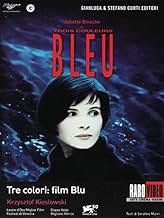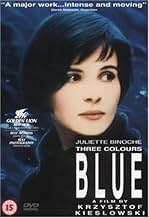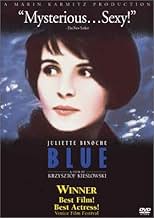Trois couleurs: Bleu
- 1993
- Tous publics
- 1h 38min
Une femme s'efforce de continuer à vivre après le décès de son mari et de leur enfant.Une femme s'efforce de continuer à vivre après le décès de son mari et de leur enfant.Une femme s'efforce de continuer à vivre après le décès de son mari et de leur enfant.
- Réalisation
- Scénario
- Casting principal
- Récompenses
- 22 victoires et 19 nominations au total
Benoît Régent
- Olivier
- (as Benoit Regent)
Charlotte Véry
- Lucille
- (as Charlotte Very)
Hélène Vincent
- La journaliste
- (as Helene Vincent)
Yann Trégouët
- Antoine
- (as Yann Tregouet)
Avis à la une
An accident results in loss and pain, the rejection of a world that you refrain, you seek withdrawal, isolation, segregation, separation, and transition to a life, where you abstain. But seclusion still has links and ties and cords, that retract and pull and cannot be ignored, reconnection through a box, reveals a secret that's unlocked, that begins to reconnect, and to restore.
It's a wonderful performance from Juliette Binoche as she elegantly weaves Kieslowski's tale of freedom into a contemporary setting. Packed full of symbolism that requires numerous visits to absorb, you may find a myriad of interpretations of your own too.
It's a wonderful performance from Juliette Binoche as she elegantly weaves Kieslowski's tale of freedom into a contemporary setting. Packed full of symbolism that requires numerous visits to absorb, you may find a myriad of interpretations of your own too.
Krzysztof Kieslowski is, unquestionably, the master of the visual narrative.
More-so than even La Double Vie de Veronique (which is much more poetic than linear in it's structure), Trois Couleurs: Bleu is a marvel of visual exposition. Due to the nature of the film, exposition in this case is not necessarily related to plot, but rather to the understanding of a human being.
Kieslowski delves so deeply into the true nature of Julie (Juliette Binoche) and in such a remarkable way that by the end of the film we understand her utterly. Free from the clutter of dialogue and, for the most part, interaction with other characters we see Julie alone and in her most natural state. Kieslowski takes his documentary background and conveys his character in an almost voyeuristic manner. Showing Julie in anything but a state of solitude would be false; due to human nature Julie with Oliver would not be Julie, but rather a reflection of her true self which, although certainly interesting, pales in comparison to observing her silently struggle with the death of her husband and daughter alone.
Kieslowski played with applying the documentary techniques, which he perfected in his early work, to the narrative form in The Dekalog with tremendous, although at times visually mundane, results. The Dekalog looks like a documentary. Here, he turns over much visual control to his Director of Photographer, Slawomir Idziak, with tremendously cinematic results. Idziak's use of color and light, combined with his groundbreaking filter work, serve to further explore Julie's character. Blue feels like a documentary and looks like a dismal Rembrandt. While Kieslowski concentrates on showing the true nature of Julie through action, Idziak contributes by showing her through light and color.
Trois Couleurs: Blue is an almost unmatched achievement in the history of cinema. Never before has a character been conveyed so splendidly and in such a visually stunning manner.
More-so than even La Double Vie de Veronique (which is much more poetic than linear in it's structure), Trois Couleurs: Bleu is a marvel of visual exposition. Due to the nature of the film, exposition in this case is not necessarily related to plot, but rather to the understanding of a human being.
Kieslowski delves so deeply into the true nature of Julie (Juliette Binoche) and in such a remarkable way that by the end of the film we understand her utterly. Free from the clutter of dialogue and, for the most part, interaction with other characters we see Julie alone and in her most natural state. Kieslowski takes his documentary background and conveys his character in an almost voyeuristic manner. Showing Julie in anything but a state of solitude would be false; due to human nature Julie with Oliver would not be Julie, but rather a reflection of her true self which, although certainly interesting, pales in comparison to observing her silently struggle with the death of her husband and daughter alone.
Kieslowski played with applying the documentary techniques, which he perfected in his early work, to the narrative form in The Dekalog with tremendous, although at times visually mundane, results. The Dekalog looks like a documentary. Here, he turns over much visual control to his Director of Photographer, Slawomir Idziak, with tremendously cinematic results. Idziak's use of color and light, combined with his groundbreaking filter work, serve to further explore Julie's character. Blue feels like a documentary and looks like a dismal Rembrandt. While Kieslowski concentrates on showing the true nature of Julie through action, Idziak contributes by showing her through light and color.
Trois Couleurs: Blue is an almost unmatched achievement in the history of cinema. Never before has a character been conveyed so splendidly and in such a visually stunning manner.
Instead of saying which is the best and worst (though have often heard 'Red' cited best and 'White' the weakest, though all three films are generally very highly thought of) of Krzysztof Kieslowski's "Three Colours" trilogy, it will just be said that all three films in the trilogy are must-watches in their own way.
The first film in the trilogy 'Three Colours: Blue' serves as a very poignant exploration of grief and liberty (in the emotional sense), and to me it is one of the most moving and interesting depictions of grief and liberty in film. It is heavily symbolic, with its intricate use of music, the dominant use of the colour blue in the colour palette, its interesting use of fade outs (though actually different to their usual use, representative of time standing still rather than it passing or a scene conclusion), links to the main character's past (here the use of falling) and the bottle recycling, but not in an incoherent sense.
Visually, 'Three Colours: Blue' looks stunning. The whole film is shot with aesthetic grace and elegance and while the use of blue is dominant for symbolic reasons it is never gimmicky or cheap. Kieslowski's direction is thoughtful and never intrusive, and the intricate music score and the symbolic way it's utilised (representing Julie's struggles with isolation) is inspired, "Song for the Unification of Europe" is one of the most emotional tracks of music in any film seen by me recently.
Story-wise, 'Three Colours: Blue' challenges in a way but also always engages, mainly because of how movingly and intensely it deals with the tragic story of Julie and its themes of grief and liberty. The pacing is deliberate but never hits a dull spot.
One of 'Three Colours: Blue' is the astonishing performance from Juliette Binoche, an intensely affecting portrayal that ranks high up with her best performances. All the cast are fine, particularly Benoît Régent and Emmanuelle Riva, but in the acting stakes this is Binoche's film.
All in all, a beautiful, thought-provoking and moving film, and a wonderful start for a very interesting trilogy of films. 10/10 Bethany Cox
The first film in the trilogy 'Three Colours: Blue' serves as a very poignant exploration of grief and liberty (in the emotional sense), and to me it is one of the most moving and interesting depictions of grief and liberty in film. It is heavily symbolic, with its intricate use of music, the dominant use of the colour blue in the colour palette, its interesting use of fade outs (though actually different to their usual use, representative of time standing still rather than it passing or a scene conclusion), links to the main character's past (here the use of falling) and the bottle recycling, but not in an incoherent sense.
Visually, 'Three Colours: Blue' looks stunning. The whole film is shot with aesthetic grace and elegance and while the use of blue is dominant for symbolic reasons it is never gimmicky or cheap. Kieslowski's direction is thoughtful and never intrusive, and the intricate music score and the symbolic way it's utilised (representing Julie's struggles with isolation) is inspired, "Song for the Unification of Europe" is one of the most emotional tracks of music in any film seen by me recently.
Story-wise, 'Three Colours: Blue' challenges in a way but also always engages, mainly because of how movingly and intensely it deals with the tragic story of Julie and its themes of grief and liberty. The pacing is deliberate but never hits a dull spot.
One of 'Three Colours: Blue' is the astonishing performance from Juliette Binoche, an intensely affecting portrayal that ranks high up with her best performances. All the cast are fine, particularly Benoît Régent and Emmanuelle Riva, but in the acting stakes this is Binoche's film.
All in all, a beautiful, thought-provoking and moving film, and a wonderful start for a very interesting trilogy of films. 10/10 Bethany Cox
This movie is one of my favorites.
The disturbing topic of a woman who can't deal with the loss of her husband and child transforms into an essay on the impossibility of isolation. It is a quiet, personal movie that spends most of it's time with the main character played excellently by Juliette Binoche.
The color blue is very evident in the film,and a fade to a simple blue screen is used to show times of deep emotion. Although the characters are set in a specific time and place ( France just before the formation of the EU ) the focus on the personal journey of grief transcends the setting.
I like the way this film changes from a story about a death to an affirmation to life. I like the way that little things like mice in the apartment loom large in the thought of our main character, where as what others consider important such as finishing her husband's symphony seem very minor .
It feels like diving deep through cold dark water to finally swim toward the light. One passes through emotional turmoil to come out the other side. I found it a very satisfying.
The disturbing topic of a woman who can't deal with the loss of her husband and child transforms into an essay on the impossibility of isolation. It is a quiet, personal movie that spends most of it's time with the main character played excellently by Juliette Binoche.
The color blue is very evident in the film,and a fade to a simple blue screen is used to show times of deep emotion. Although the characters are set in a specific time and place ( France just before the formation of the EU ) the focus on the personal journey of grief transcends the setting.
I like the way this film changes from a story about a death to an affirmation to life. I like the way that little things like mice in the apartment loom large in the thought of our main character, where as what others consider important such as finishing her husband's symphony seem very minor .
It feels like diving deep through cold dark water to finally swim toward the light. One passes through emotional turmoil to come out the other side. I found it a very satisfying.
10patita-1
The subject(mourn,lost)is so interesting and profound that this film is a real treasure. It is very difficult to write about 'Bleu' because this film has so many intense scenes,with many details.Juliette Binoche's vulnerability is in every scene, every gesture, every moment. She plays an enigmatic woman,'Julie,' we're witness to her terrible loss(her husband who was a famous composer and her daughter died in a car crash)She is the survivor,not only of the accident,but of herself too.The film doesn't show us how her life was before the tragedy,but' Bleu' focuses on her personal journey to healing.
Julie seems stoic,she did not criy hysterically or stay in bed totally depressed,her grief is intimate and touching.In one scene when Julie is near the blue crystal mobile(which belonged to her daughter) just notice her reaction.Another poignant scene is when Julie is in that swimming pool,suddenly,she stops and she can hear her husband's symphony(all in her head).
Bleu also approaches a philosophical question-when you lose everything can you start all over again?,life is a series of events and choices,Julie moves to another place from the country to a city.She did not want to see her friends,she wants to be alone but is this possible?,her past will haunt her.
Another interesting aspect of this film is the use of music instead of dialogue,her silence is a reference of her terrible loss and pain,she is not depressed but sad. Also the meaning of the unfinished symphony of her husband is very profound (is connected with her grief and healing)
The photography of the film and the beautiful and delicate face of Binoche contribute to the impact of BLEU.
Kieslowski was one of the most talented directors, I really admired his 'Trois couleurs' trilogy but I think,'Bleu' was his most powerful film.
10/10
Julie seems stoic,she did not criy hysterically or stay in bed totally depressed,her grief is intimate and touching.In one scene when Julie is near the blue crystal mobile(which belonged to her daughter) just notice her reaction.Another poignant scene is when Julie is in that swimming pool,suddenly,she stops and she can hear her husband's symphony(all in her head).
Bleu also approaches a philosophical question-when you lose everything can you start all over again?,life is a series of events and choices,Julie moves to another place from the country to a city.She did not want to see her friends,she wants to be alone but is this possible?,her past will haunt her.
Another interesting aspect of this film is the use of music instead of dialogue,her silence is a reference of her terrible loss and pain,she is not depressed but sad. Also the meaning of the unfinished symphony of her husband is very profound (is connected with her grief and healing)
The photography of the film and the beautiful and delicate face of Binoche contribute to the impact of BLEU.
Kieslowski was one of the most talented directors, I really admired his 'Trois couleurs' trilogy but I think,'Bleu' was his most powerful film.
10/10
Le saviez-vous
- AnecdotesAt the 2018 Visegrad Film Forum, cinematographer Slawomir Idziak claimed that the script and initial cut of this film focused on the journalist character (played by Hélène Vincent) and her efforts to investigate the authorship of the unfinished musical composition that drives the plot. It was only during the editing process that director Krzysztof Kieslowski re-structured the film to focus on Julie (played by Juliette Binoche).
- GaffesWhen Oliver tells Julie he will not incorporate her changes into the musical score, a boom mic is visible briefly as Julie puts down the phone.
- Citations
Julie Vignon: Now I have just one thing left to do: nothing. I want no possessions, no memories, no friends, no lovers -- they're all traps.
- Crédits fousThe final credit says in French, "We thank Alfa Romeo who allowed the scene of the accident to the Alfa 164 whose dynamics are of course purely imaginary."
- ConnexionsFeatured in The 51st Annual Golden Globe Awards (1994)
Meilleurs choix
Connectez-vous pour évaluer et suivre la liste de favoris afin de recevoir des recommandations personnalisées
- How long is Three Colors: Blue?Alimenté par Alexa
Détails
- Date de sortie
- Pays d’origine
- Site officiel
- Langues
- Aussi connu sous le nom de
- Bleu
- Lieux de tournage
- Palais de Justice, Paris 1, Paris, France(hall of justice)
- Sociétés de production
- Voir plus de crédits d'entreprise sur IMDbPro
Box-office
- Montant brut aux États-Unis et au Canada
- 1 324 974 $US
- Week-end de sortie aux États-Unis et au Canada
- 6 413 $US
- 5 déc. 1993
- Montant brut mondial
- 1 554 108 $US
- Durée
- 1h 38min(98 min)
- Couleur
- Mixage
- Rapport de forme
- 1.85 : 1
Contribuer à cette page
Suggérer une modification ou ajouter du contenu manquant

![Regarder Bande-annonce [OV]](https://m.media-amazon.com/images/M/MV5BZGFhMTA5ODQtM2Q4OC00NTI0LTkyYjgtMGViODA0YWZjZmI3XkEyXkFqcGdeQXRyYW5zY29kZS13b3JrZmxvdw@@._V1_QL75_UX500_CR0)
![Three Colors: Blue: The Criterion Collection [Blu-ray]](https://m.media-amazon.com/images/M/MV5BZThmZGMzY2EtZTdiNy00NjMwLTk1YTQtOTVlNGIxYjRhZGYzXkEyXkFqcGdeQXVyNzU1NzE3NTg@._V1_QL75_UX500_CR0)































